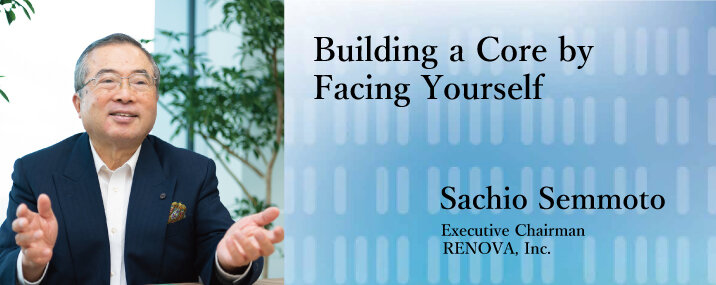Vol.23 Interview with Donors

Sachio Semmoto
Born in Nara Prefecture. Graduated from Kyoto University's Faculty of Engineering in 1966. After working at Nippon Telegraph and Telephone Public Corporation (now NTT), co-founded DDI Corporation (now KDDI) with Kazuo Inamori and others. Subsequently, launched E-ACCESS and EMOBILE as CEO and has been leading the expansion of both companies for a long time. Became chairman of RENOVA in 2015. Served as a professor at Keio University Graduate School, a visiting professor at the University of California, Berkeley, and Carnegie Mellon University, and a visiting fellow at Stanford University. Ph.D. (electronics). IEEE Fellow.
Q Would you care to share with us your college memories?
When I was a high school student, I visited several universities, but I was attracted to Kyoto University's free and mature atmosphere and decided to enter the school.
The phrase "free and mature" sounds good, but you have to decide what to learn and how to learn it all by yourself, and because you are free, you are expected to do things differently, and because you are different, you have to challenge yourself. To be free and mature is actually very strict. So I think Kyoto University respects being different.
I have always had a resistance to being different, but during my days at Kyoto University, I developed a tolerance for diversity and a mindset of "Just give it a try." I learned the importance of thinking about the meaning of being different and sitting back and taking on challenges once you come to a conclusion you are comfortable with. Thanks to that, I was able to take on the challenge of quitting NTT and starting DDI Corporation, which to other people would have seemed like a headlong rush.
By the way, the University's liberal academic culture is not unrelated to its location in Kyoto. In Kyoto, where there is a strong conservative temperament due to the preservation of its long history, it is easy to develop a sense of wanting to break traditions and conservative customs at the same time. This may be the reason many Kyoto companies are distinctive, as is Kyoto University.
Q Is it true that you put a lot of effort into your circle activities and
enjoyed your dormitory life to the fullest?
Yes. Those are the two pillars of my time as a student at Kyoto University.
The circle I belonged to was the Kyoto University Catholic Studies Association, commonly known as the "Catholic Association." The first half of the 1960s was a time when young people were highly aware of social issues and student movements were fierce not only in Japan but also around the world. In this context, in cooperation with student federations and other organizations that exist not only in Japan but also around the world, with the aim of applying results to activities, we held discussions under the theme of "How should Christianity confront social problems and deal with political ideologies? Should we not have a more liberal and open dialogue?" As a student and a Japanese citizen, I devoted all of my energy to confronting social issues during those four years.
The other pillar is life at the Uminohoshi Gakuryo dormitory. It was a dormitory established by a local philanthropist as part of human resource development, where students of different universities, faculties, and ages lived and discussed every night "why people live" and "what role religion should play." It was refreshing to hear the opinions of students from different backgrounds.
One of my fondest memories is that the home of Professor Takeshi Umehara, who was an assistant professor at the time, was directly across the street from our dormitory, and several of us dormitory students would often visit him. Professor Umehara always welcomed us and held philosophical discussions with us. Not only Professor Umehara but all professors at Kyoto University were very open-minded and generous. The fact that students have easy access to professors is what makes Kyoto University unique.
Because I led such a student life, my studies were minimal. I was good at cramming and got top grades, but I never felt that I truly studied. When I really studied were the intense three years I spent in graduate school in the United States. Even so, I think it was much more meaningful to have the freedom to do what I wanted to do to the best of my ability and to be able to build a spiritual connection with my fellow students.
Q What kind of efforts do you look forward to seeing Kyoto University
make, and is there a message you want to leave Kyoto University
students with?
What I would like Kyoto University and Kyoto University students to enhance is globalization. I would like Kyoto University to refine its edgy personality and focus on creating appeal that would make students around the world want to study at Kyoto University. I hope that students will sharpen their sensitivities as they come into contact with diverse cultures and people and will gain a keen perspective that will allow them to keep abreast of global trends.
First of all, you need to have a core idea of what you want to do and who you want to be, and then you need to think about how to make that happen. However, I feel that young people these days tend to drift in the direction of gaining experience that is advantageous for employment without having a core. Since Kyoto University students are in Kyoto, a tranquil place with a rich history, I want them to take the time to think deeply and face their inner self. I also hope that Kyoto University will set its sights high and demonstrate a presence that cannot be found anywhere else in the world while emphasizing its strength of being located in Kyoto.
(Interviewed in March 2021)


